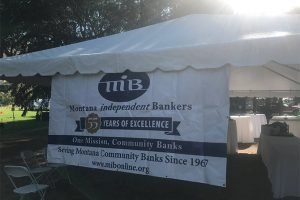As a native of Missoula, I have lived in Western Montana my entire life. I grew up the oldest of four siblings (two brothers and one sister), attended high school at Sentinel, then graduated from the University of Montana with a bachelor’s degree in Business Administration with an emphasis in Finance. I was lucky enough to marry my college sweetheart Beth shortly after graduation. She has been an amazing partner in our life’s journey together, the most fulfilling of which has been raising our two boys, Ben and Garrett, to be amazing young men.
I am currently the Chief Credit Officer at Farmers State Bank, where I began my banking career in 1998. In my free time, I enjoy numerous outdoor activities that living in Montana provides and have started working on getting my private pilot’s certificate.
Regarding my banking career, the last thing I wanted to be after college was a banker. That mindset had to do with several things that I won’t dive into other than to say my family had limited resources and didn’t have great credit experiences. The banking classes I took in college didn’t help my mindset, as I remember them being incredibly complicated and focused more on corporate banking topics. I don’t remember any exposure to the inner workings of a community bank or that there was any difference between large corporate banks and smaller community banks.
Prior to banking, I worked at a stock brokerage firm in Missoula and was absolutely miserable. Luckily, through a series of fortunate events put into place by my wife Beth, I connected with a banker at Farmers State Bank. He mentioned that the bank was looking for a new credit analyst and that I should apply. While I believed I didn’t want to be a banker, I knew for sure I didn’t want to be miserable the rest of my life, so I jumped at the chance to apply. I was hired on as the credit analyst and quickly learned that what I believed to be true about bankers at the time was incorrect.
What I enjoy most about my work at the bank is the opportunity to help people, regardless of the different roles I’ve had during my banking career. Whether helping bank customers during my time as a lender or helping fellow staff improve their banking skills, I have always strived to make a positive impact whenever possible.
I became a member of the MIB board of directors because of, in two brief words, Kenny Martin. I remember working with him on a loan participation, and he started promoting the organization and asking if I’d like to get involved. For those of you who know Kenny (there aren’t many who don’t), then you know exactly what I’m talking about. I attended one of MIB’s annual conventions and met many cool bankers from across the state, and I remember thinking this was a great group of people and regretting that I hadn’t attended in previous years. It was an entirely new aspect of banking I had missed out on and wanted in.
If I had the opportunity to impact any young people interested in banking, first, I’d clarify that there is a vast difference between large, corporate banks that tend to receive a lot of negative press (sometimes deservedly so) and community banks. I’d tell them NOT to make the mistake I did and base any belief of what a “banker” is on these large institutions. Community banking is a great career full of opportunities.
An important piece of advice I received – that wasn’t really advice – came from my first boss, who consistently asked me at the end of the workday, “Well, did you earn your paycheck today?” It would always make me reflect on my efforts that particular day, and if I didn’t feel I had given my best, you could bet that I would put in the extra effort the next day.
Regarding the future of community banking in Montana, I foresee there will always be a need for community banks, but remaining a relevant industry will continue to be a challenge. I would like to see a community banking industry that grows and gets stronger as a whole, even while the number of players continues to shrink. With the ability of consumers to bank anywhere with any bank at any time, the definition of “community” is shifting. As an industry, we need to be smart enough to shift with it and promote the values community banking stands for.
Community bankers in Montana can benefit – tangible and intangible – from being a member of MIB. The most important benefits are the connections one makes with fellow bankers across this and other states. Every banker has similar struggles, works with similar vendors, has similar regulators, and works to keep their community bank relevant. To me, having conversations about these and other items with your peers is invaluable.






